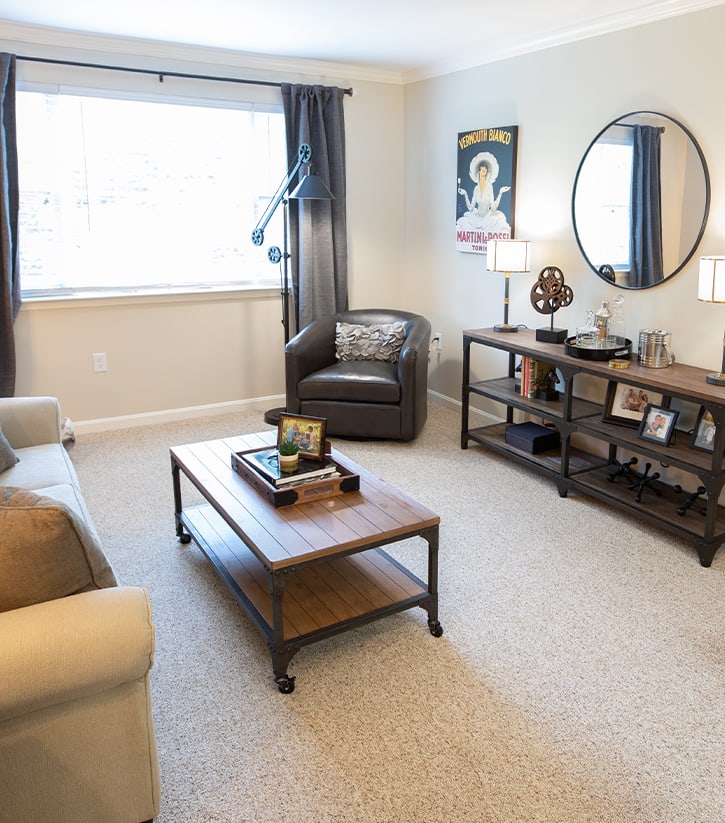Deciding that a loved one needs additional care is never easy, especially when it involves separating aging parents who have shared a home and life for decades. While the decision to explore assisted living often comes with mixed emotions, understanding your options and how to address the situation thoughtfully can make the process smoother.
Some senior living communities offer spouses who do not need assisted living to join their partner; however, when that choice is unavailable, separate living situations can be created for your loved ones by prioritizing open communication and regular visitation.
What Is Assisted Living?
Assisted living combines an independent environment with the availability of support services such as medication administration, meals, nursing care, activities, medical services, and transportation.
The setting can benefit those who need minimal care but would prefer a community-based social network to those for whom the daily upkeep of a house and transportation has become a burden or those who require more help after a medical event or impairment.
Assisted living ensures seniors maintain their quality of life while receiving the care they need in a safe, supportive environment.
Who Qualifies For Assisted Living?
Assisted living is ideal for primarily independent individuals who need help managing daily responsibilities. Some signs that an aging parent may qualify for assisted living include:
- Struggling with personal hygiene, dressing, or grooming.
- Difficulty managing medications or remembering to take them.
- Mobility challenges or increased risk of falls within their current home.
- Forgetting to cook or prepare meals.
- Social withdrawal and isolation.
- Difficulty keeping up with household chores.
Professionals at assisted living facilities often conduct evaluations to determine whether the community is the right fit for an individual’s specific needs.
Can Partners of Assisted Living Residents Move in Together?
Some assisted living communities offer flexible accommodations that allow couples to move in together, even if only one requires care. These communities can provide shared apartments for couples to continue living together in the same space and individualized care plans to ensure that spouses who don’t need assistance can maintain their independence. Discuss this option with the community to see if it aligns with your parent’s needs and wishes.
However, not all couples may want to or be able to live together in an assisted living community. Factors like cost, location, and personal preferences heavily influence these decisions.
Managing a Senior Living Separation
If an assisted living arrangement for both parents isn’t feasible, families may have to consider separate living solutions. Here are steps to handle this transition thoughtfully:
- Maintain open communication: Ensure both parents are included in the decision-making process. Highlight this setup’s benefits, such as access to proper care for one parent while allowing the other the freedom to thrive.
- Prioritize visits and connection: Reassure both parents that their relationship will still be prioritized. Set a visitation schedule and suggest regular phone or video calls to keep them connected.
- Utilize support resources: Lean on local or online support groups for families navigating similar challenges. Moving a loved one to assisted living is emotional and can feel overwhelming if you don’t have a network of support.
- Address your other parent’s needs: The spouse at home may feel lonely or guilty. Encourage them to stay active in their community by joining senior-focused social groups, attending day programs, or engaging in hobbies.
Making thoughtful decisions with both parents’ well-being in mind can ease the transition considerably.
How to Talk to Your Parents About Assisted Living
Conversations about assisted living can be emotional and complex. Begin discussing future living arrangements before they become an urgent need. Some parents may resist the idea initially. Give them time to come to terms with the change and revisit the conversation when ready. This gives parents time to process and become comfortable with the idea.
Your parents should feel ownership over their decisions. Take them on tours of communities and empower them to ask questions. Highlight how assisted living can make life easier and more enjoyable. Share specific examples, such as maintaining independence, meeting new friends, and exploring activities.
What If Your Parent Refuses Assisted Living?
It’s not uncommon for senior parents to dismiss the need for assisted living. Here are a few tips to address their concerns:
- Understand their hesitations: Listen to their fears or doubts. They might need to fully understand the benefits or be scared of losing autonomy.
- Enlist a trusted voice: Sometimes, advice from a doctor, clergy member, or trusted friend can resonate more than advice from family.
- Take small steps: Suggest short-term stays or respite care to help them understand the idea of assisted living.
If they decline at first, keep the conversation open. Circumstances can change, and they may come around when they’re ready.
The Benefits of Assisted Living
Despite the initial transition period, assisted living offers numerous long-term advantages:
- Access to care: Immediate help with day-to-day activities or medical needs provides peace of mind for families.
- Improved quality of life: Assistance with daily challenges allows seniors to focus on what they enjoy—hobbies, socializing, and relaxation.
- Healthier and safer environment: Seniors can thrive in a community designed for their age group with safety measures like grab bars, emergency call systems, and staff support.
- Community and social engagement: Seniors can make new friends, engage in group activities, and combat loneliness.
- Convenience: No more worrying about home maintenance, meal prep, or transportation.
Assisted living enhances seniors’ ability to enjoy life while accessing the care they require. By prioritizing their health, happiness, and connection with each other, this transition to assisted living can become a step toward greater well-being for your entire family.
At Paul Spring Retirement Community, we offer both independent living and assisted living, allowing both parents to reside in the same apartment while receiving the exact level of care they need.
Paul Spring Retirement Community knows early planning is key to making an informed senior living decision. Contact us today to see if our community could be a good home for your loved ones.












